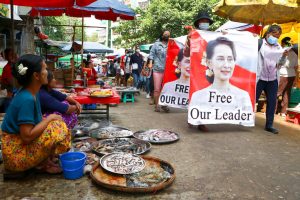Myanmar’s state election commission announced it is prosecuting the country’s ousted leader, Aung San Suu Kyi, and 15 other senior political figures for alleged fraud in last November’s general election.
The announcement was published Tuesday in the state-run Global New Light of Myanmar newspaper and other official media.
Allegations of widespread electoral fraud were the main reason cited by the military for its February 1 seizure of power that toppled Aung San Suu Kyi’s government. Her National League for Democracy party was about to begin a second five-year term in office after its landslide victory in the polls. The army-backed Union Solidarity and Development Party suffered unexpectedly heavy losses.
Independent observers, such as the Asian Network for Free Elections, found no evidence of substantive irregularities in the polls, though they criticized some aspects.
The action by the Union Election Commission could potentially result in the NLD being dissolved and unable to participate in a new election the military has promised will take place within two years of its takeover. However, the commission’s notice, dated Monday, did not specify which laws would be used to prosecute the accused.
In May, the military-appointed new head of the election commission said his agency would consider dissolving Aung San Suu Kyi’s former governing party for alleged involvement in electoral fraud and have its leaders charged with treason. Commission Chairman Thein Soe said an investigation had determined that the party had worked illegally with the government to give itself an advantage at the polls.
After taking power, the military dismissed the members of the election commission that had certified the results of last year’s poll and appointed new ones. It also detained members of the old commission, and, according to reports in independent Myanmar media, pressured them to state there had been election fraud.
The new commission declared last year’s election’s results invalid.
The new notice from the commission said Aung San Suu Kyi, former President Win Myint, other leading figures in her party, and the commission’s former chairman were “involved in electoral processes, election fraud and lawless actions” related to the polls.
It accused 16 people of carrying out illegal actions, including compelling local election officials to obstruct military polling booths, threatening such officials in connection with advance voting for voters over 60 years old, forcing local officials to approve voting lists that included ineligible voters, and interfering in campaigning to favor the NLD.
Aung San Suu Kyi is already on trial or charged in about a dozen criminal cases in which a conviction would almost certainly bar her from running for office again. Several of her top political allies also have been tried or are facing charges. Aung San Suu Kyi’s supporters as well as independent rights organizations contend that the cases are spurious and meant to discredit the former leader and her party while legitimizing military rule.
A court in the capital Naypyidaw is scheduled to give its verdict on November 30 in a case in which Aung San Suu Kyi, Win Myint, and former Naypyidaw mayor Myo Aung are co-defendants, a person familiar with the proceedings said Tuesday. The person spoke on condition of anonymity because the government tightly restricts information about the trial.
The verdict would be the first rendered in any of the current cases against Aung San Suu Kyi. The charge of incitement, sometimes called sedition, is generally defined as spreading false or inflammatory information that could disturb public order.
Dissolving Aung San Suu Kyi’s NLD would follow a regional trend of dissolving popular political parties seen as a threat to governments in power.
Cambodia’s high court in 2017 dissolved the Cambodia National Rescue Party, the sole credible opposition force, ahead of a 2018 general election.
Thailand’s Constitutional Court in 2020 dissolved the newly formed Future Forward Party, which had won the third highest number of seats in the lower house in the 2019 general election.
In both the Cambodian and Thai cases, the courts cited specific violations of the law for their rulings, but their actions were widely seen as reflecting political pressures.

































